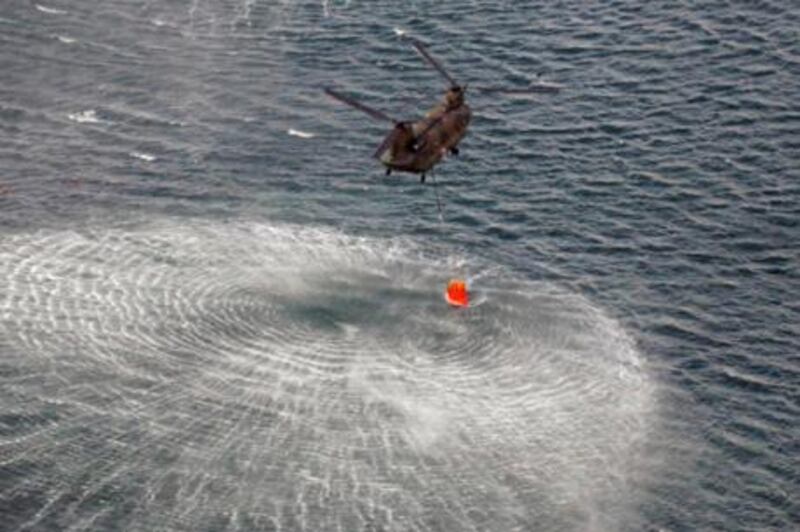Helicopters will drop water again today on reactors at Japan's stricken Fukushima nuclear power plant in an effort to avert a meltdown.
Tonnes of water were dumped on the plant yesterday by military helicopters and water cannon as engineers tried to restore cooling systems nearly a week after they were knocked out by a devastating earthquake and tsunami.
While expatriates and tourists flocked to airports to flee the country, tens of thousands of tsunami survivors shivered in miserable conditions in north-east Japan. Food is running short and power supplies are limited.
High radiation levels forced the abandonment of water drops on Wednesday, but yesterday Japanese military helicopters flew a series of missions over the plant.
The aircraft, with lead plates installed beneath them as radiation shields, had to keep moving while they dumped their loads, since hovering would have increased radiation exposure. Nonetheless, officials said the operations had helped to lower temperatures, crucial to avoid a meltdown that could release large amounts of radiation.
The No 3 reactor, seen as critical because it contains plutonium in its fuel mix, will be targeted during today's missions.
Attempts by police to use truck-borne water cannon on the stricken reactors were scrapped because of high levels of radioactivity. Later, however, military vehicles, which do not require their operators to go outside, were able to begin dousing operations.
By the time this work ended, five of the vehicles had blasted 30 tonnes of water into the building housing the No 3 reactor. It was unclear last night whether this action had helped to cool the facility.
A power cable was connected yesterday that should allow cooling systems on some of the plant's reactors to be restarted, potentially helping operators to safely cool the reactors.
Amid concern over the extent to which Japan is giving a complete picture of the seriousness of the situation at Fukushima, the Chinese foreign ministry spokeswoman, Jiang Yu, called on Tokyo yesterday to pass on information about developments in an "accurate and swift way".
Although the Japanese authorities said radiation levels at the plant had fallen yesterday, readings dramatically above normal were recorded in nearby cities. In Fukushima city, 80km north-west of the plant, they were 340 times normal, while in Koriyama the figure was 45 times normal. Officials insisted these amounts did not pose significant dangers.
However, more countries advised their citizens to leave Japan or head south of Tokyo yesterday; the United States and the United Kingdom said they were sending aircraft to retrieve their nationals, while the US is allowing families of diplomatic staff to leave. Several countries followed the US example in advising citizens to remain at least 80km from the Fukushima plant.
As anxiety over radioactive fallout persists, Germany and Austria are moving their embassies to Osaka, further south of Tokyo.
Despite the apparently growing concern of the international community, Graham Andrew, an official with the International Atomic Energy Authority, said last night that although "very serious", the situation at Fukushima did not show "significant worsening" yesterday, offering a glimmer of hope amid days of downbeat assessments.
The developing nuclear crisis has partly overshadowed the continuing human tragedy caused by the earthquake and the devastating 10-metre tsunami it created.
Officials yesterday put the death toll at 5,300, with a further 9,300 missing, although some foreign media reports predicted the final number killed could reach 25,000.
In conditions approaching freezing, about 850,000 households in affected areas remain without electricity. An estimated 450,000 people are living in shelters, many of which also lack in power.
Overseas experts said the world should not forget the tens of thousands left homeless.
Richard Wakeford of the University of Manchester in tjhe UK said: "People are getting so concerned about what are at the moment pretty low levels of radiation as far as the general public is concerned. But the real problems are in dealing with the earthquake and the tsunami."
Problems such as providing safe drinking water and disposing of sewage were critical to prevent deaths from killer diseases, he added, even if outbreaks in a developed nation were unlikely. "If this was a developing country, we'd have people going down in their hundreds and thousands with the likes of typhoid and cholera by now," Dr Wakeford said. "The questions should be: where is the sewage going? What is the state of the drinking water? If I were a public health official, that would be my principle concern."
Some residents of affected areas, including the city of Sendai, which was home to one million, are fleeing the area as food supplies lead to lengthy queues at supermarkets, and concerns over radioactivity continue.
On a positive note, forecasters are predicting temperatures in the area will increase by several degrees over the coming two days, providing a little comfort to the thousands whose homes have been destroyed.






